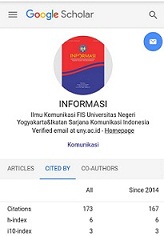Influence of Climate Change Communication on Responsible Environmental Behaviour among Residents of Niger State
Keywords:
Climate, Change, Communication, Responsible, Environmental, BehaviourAbstract
Effective communication strategies can increase public awareness and understanding of climate change, leading to behavioural changes that support environmental sustainability. However, how climate change communication has influenced responsible environmental behaviour among residents of Niger state has largely remained uncertain. The study was guided by four research objectives with survey as the method of enquiry, while the questionnaire served as the instrument for data collection. Taro Yamane (1964) statistical formula was used to arrive at a sample size of 400 respondents derived from the study population, while the theory of reasoned action (TRA) served as the theoretical framework. Findings revealed high level of awareness and knowledge of climate change communications among residents of Niger state with radio and public campaigns identified to have played crucial roles in disseminating climate change information. The study concluded that, diverse communication channels and appropriate framing techniques should be utilized to not only create awareness about climate change effects, but to also drive people to act to maintain a sustainable environment. It was recommended among other things that climate change messages should be disseminated utilising both the conventional and social media to educate and inform a more diverse and heterogeneous audience.
Keywords: Assessment, Health Communication, Immunization, Strategies, Women
References
Chamcham, J., Pakravan-Charvadeh, M. R., Maleknia, R., & Flora, C. (2024). Media literacy and its role in promoting sustainable food consumption practices. Scientific Reports, 14(1), 18831.
Obracht-Prondzyńska, H., Duda, E., Anacka, H., & Kowal, J. (2022). Greencoin as an AI-based solution shaping climate awareness. International Journal of Environmental Research and Public Health, 19(18), 11183.
Oyero, O. A. (2017). "˜Effects of climate change on health risks in Nigeria', Asian Journal of
Business and Management Sciences, 1(1), pp. 204-215.
Pradere, B., Mallet, R., de La Taille, A., Bladou, F., Prunet, D., Beurrier, S., ... & Pinar, U. (2023). Climate-smart actions in the operating theatre for improving sustainability practices: a systematic review. European urology, 83(4), 331-342.
Rickerby, A., & Green, R. (2024). Barriers to Adopting a Plant-Based Diet in High-Income Countries: A Systematic Review. Nutrients, 16(6), 823.
Spence, A., Poortinga, W., & Pidgeon, N. (2012). The psychological distance of climate change. Risk Analysis: An International Journal, 32(6), 957-972.
Xu, X. (2024). Frequent occurrence of extreme weather and out-of-balance climate systems. The Innovation Geoscience, 2(1), 100049-1.
ИкрÑм, Ð., & Юр, Ð. С. (2024). Environmental migration : a new challenge for the global community. ÐœÐ¸Ñ€Ð¾Ð²Ð°Ñ Ð¿Ð¾Ð»Ð¸Ñ‚Ð¸ÐºÐ°, (2), 1-14.
Downloads
Published
How to Cite
Issue
Section
Citation Check
License
Copyright (c) 2025 Andrew Hyacinth Ngene

This work is licensed under a Creative Commons Attribution-NonCommercial 4.0 International License.
Authors who publish with this journal agree to the following terms:
- Authors retain copyright and grant the journal right of first publication with the work simultaneously licensed under a Creative Commons Attribution License that allows others to share the work with an acknowledgement of the work's authorship and initial publication in this journal.
- Authors are able to enter into separate, additional contractual arrangements for the non-exclusive distribution of the journal's published version of the work (e.g., post it to an institutional repository or publish it in a book), with an acknowledgement of its initial publication in this journal.
- Authors are permitted and encouraged to post their work online (e.g., in institutional repositories or on their website) prior to and during the submission process, as it can lead to productive exchanges, as well as earlier and greater citation of published work (See The Effect of Open Access).











